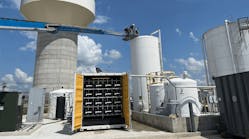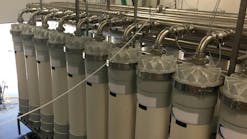By Carlos David Mogollon, Managing Editor - Industrial WaterWorld
Global director of Water Resource Industry and Product Management for the Pumps Division at Flowserve Corp., C.J. "Chuck" Powers was interviewed at the Water & Wastewater Equipment Manufacturers Association 100th Annual Meeting at Loews Ventana Canyon Resort in Tucson, AZ, in October 2008.The following interview corresponds with an article that appeared in Industrial WaterWorld ("Executive Corner: Flowserve's Powers Focuses on the Future"). Read on to learn more about our discussion:
--
IWW: I'm here with Chuck Powers of Flowserve and we're at the WWEMA Annual Conference. We're going to talk a little bit about Flowserve as well as some of the things they have coming up in the future. Chuck, tell me a little bit about yourself and your background for our readers, please.
Powers: Sure, I've been with Flowserve for over 30 years, starting with the legacy company Ingersol Rand. It also comprises companies like Worthington, Byron Jackson, and Stork – well-known, well-branded organizations. My key role is industry leader for water resources globally as well as a pretty large portion of product management for products of the company.
IWW: Update me if you could on your title, because we haven't talked about it in a while and I believe it's changed recently.
Powers: I'm director of the company for the industry and for water resources and for product management.
IWW: How long have you worked for the company again?
Powers: 31 years.
IWW: Right now, what are some of the key things happening at Flowserve that are kind of moving and shaking things?
Powers: We participate in five key market areas, industries in regards to water resource -- the power industry, the chemical, general industrial -- which is a broad line of industries by itself, such as mining, steel, whatever, and then, of course, the last one is oil & gas. All of these industries are evolving. We're all well aware of the economic changes that have taken place over the last month or so, and it's a matter of adjusting and understanding what those changes mean to us and what impact they have on a company like ours globally.
IWW: What's the general outlook on that right now?
Powers: Well, on a daily basis we're seeing where things are changing such as the oil & gas industry relative to the dollars per barrel, which is down.
IWW: It's dropped dramatically.
Powers: Yes it has.
IWW: What's it gone from, $150 or so a barrel all the way to...
Powers: I think it's between the $50 and $60 range right now. But the projects we have in our backlog are very strong. We have a tremendous focus on a lot of other market areas to make sure that we're well balanced. And that's working very well. And we have a considerable number of facilities globally, over 30 of them of major size. We're well balanced from that standpoint also to make sure we stay focused on the different regional issues that occur.
IWW: How's that playing out with different market areas other than oil & gas?
Powers: Very well. I mean, we're like I said in five key industry areas.
IWW: A lot of them correspond with what Industrial WaterWorld focuses on, which are power generation, oil & gas, chemical processing, food & beverage, and pulp & paper, as well.
Powers: Right, and I would say at this point in time that nobody has a clear understanding of the crystal ball where things are going in the next six months or year because we have a new president and a new government coming in the United States. There's also a global impact as to the financial world and a lot of those things can have adverse effects or positive effects on different industries.
IWW: A lot of things are up in the air right now. There's been a lot of talk in recent days, as well as discussion at the conference here, about proposed economic stimulus packages that may focus heavily on infrastructure, not just in the U.S. but in China, and how those may play out. What's your perspective on those?
Powers: Well, in those different industries, we feel very comfortable. We're very much engaged. We're working on a lot of projects. There's no signs of any significant change at this point. Everybody is trying to prepare themselves for some of these things, such as a stimulus package. But the power industry is very strong in China. The power industry is good in India, another high population space. In the U.S., they're showing some great signs of strength, including the nuclear (power industry) coming back.
IWW: Okay. Flowserve's business has historically been a lot about pumps, but you do much more than pumps. Talk to me about some of the different market areas and how they fit into the mix of the company's focus, if you could, please.
Powers: Flowserve has three primary areas where we focus. We have the pumps themselves (and are one of the biggest producers in the world). We also deal with the mechanical seal industry. And we also have a valve group. Those three combine to form the total. But Flowserve is also big into the services side, servicing customers, the aftermarket. You know, the services industry by itself, as we learned here at WWEMA, there's going to be a big trend in retrofitting and the servicing old stations and getting them upgraded or increased or improved in their capacity levels or whatever. I think in the power industry, there're a lot of plants out there that are going to require a lot of upgrades and changes. We're very focused on that. We have a considerable amount of QRCs as they're called... Quick Response Centers to respond as needed.
IWW: There's a lot more emphasis placed on sustainability and life cycle issues as part of that which play very well into your business, too.
Powers: Exactly. And Flowserve also is heavily engaged in a lot of new market areas such as the geothermal, such as some sub-sea activity and several others.
IWW: I'm not very familiar with the sub-sea business?
Powers: That has to do with the primary source expiration of oil and gas and at much deeper levels of the ocean. But, also, in geothermal, we have brand new technology we're coming out with for deeper and much higher temperature applications. There's a lot of good activity going on that basis.
IWW: What are some new other things that Flowserve has been getting into? You just mentioned geothermal...
Powers: Yes, that's one of them. The subsea is another. We also have some special projects that I can't really get into now because they're still in the due diligence phase and all. It's closed out. But Flowserve is very focused on new technologies and new systems and what we can do to help improve and develop things.
IWW: Now, coming back to the economic stimulus package, there's been some discussion here on how that might impact the water and wastewater industry. And you'll recall I mentioned earlier about listening to Gov. Jennifer Granholm from Michigan who was talking on behalf of the Obama Administration about projects that could benefit. She noted on NPR recently that if there's a 90- to 120-day window in which they can be put into play, those might be where some of this economic stimulus package might have some emphasis in terms of infrastructure -- which seems to be received here very well because scorecards on U.S. infrastructure, particularly water and wastewater, have been so poor for the past several years. If we can put some money toward that, it opens up a window for our particularly industry. What's your perspective on that?
Powers: I can't really comment because I don't know how that's going to turn out.
IWW: Are there geographic areas elsewhere in the world that you see showing some promise or that in the past you're hoping will continue as we see, again, fallout from global economic issues?
Powers: I don't know how to answer that either. Flowserve is very broad globally. We have a lot of facilities in a lot of countries globally, so we already have footprint and are very actively engaged. Looking at a location and saying we perceive this as being a great growth area or where we see a lot of opportunity is a bit difficult at the moment. We're in a lot of places already.
IWW: Where have you your emphasis? A lot of companies, for instance, have put together these regional Centers of Excellence or Regional Engineering Centers. Where has Flowserve targeted its interests from that perspective?
Powers: We have done that also, but we also look at the Lead Product Centers, tying both engineering and manufacturing together in a location, so you have the expertise of the people actually making the product tied into the people who are making it.
IWW: You recently made an effort in the Netherlands, didn't you?
Powers: Several.
IWW: There was also a recent Regional Engineering Center opened there, correct?
Powers: Yes. We also opened one in the Kingdom -- the Kingdom of Saudi. We've had some expansions we've done in India with the engineering center there, so that we get closer to the customers to serve them better and take care of the needs they have for the future.
IWW: A lot of companies have pinpointed Singapore as a key market for Asia in recent years as well.
Powers: We have several facilities in Singapore. One of them is a QRC service center and we've been very active there for years.
IWW: Do you have any significant emphasis on Latin America?
Powers: Yes, we have several facilities, with factories in several key countries for a major footprint to manufacture product.
IWW: Brazil is always a market that you have to do manufacturing in-country to be able to tap that market effectively.
Powers: We are in Brazil in São Paulo. We're in Venezuela, Chile, Bogota...
IWW: Not that you have to look into your crystal ball, but for you what's happening with your business and what do you foresee happening over the next several months? Bear in mind, this likely will be in the issue coming out in December.
Powers: I think everybody is trying to get a good understanding of where things are going. I don't think I or anyone could answer that adequately right now. I do know that things are very well. We've got a good backlog. We're forseeing some good projects still on the horizon. But I don't know if I could predict that far out.'
IWW: Like everyone else, you're keeping a close eye on everything?
Powers: Sure, sure. We're going to balance ourselves and adjust accordingly and make sure that we support the industries as well as support our stockholders to provide them the returns they expect?
IWW: What's your perspective on some of the moves that have been happening on a macro-scale, for instance, efforts to stabilize the financial and credit markets as well as economic stimulus packages being discussed?
Powers: Yes, I can't really comment there.
IWW: Okay, that should about do it then. I want to thank you for taking the time to speaking with us and sharing your thoughts with our readers.
--
CONTACT:
C.J. Powers
Director, Water Frontline Team Worldwide
Email: [email protected]
Flowserve Corp. - Pump Division
Millennium Center
222 Las Colinas Blvd., 15th Floor
Irving, TX 75039-5421 USA
Tel: 1-800-728-PUMP (7867) or 1-972-443-6500
Fax: 1-972-443-6800
Web: www.flowserve.com
###

